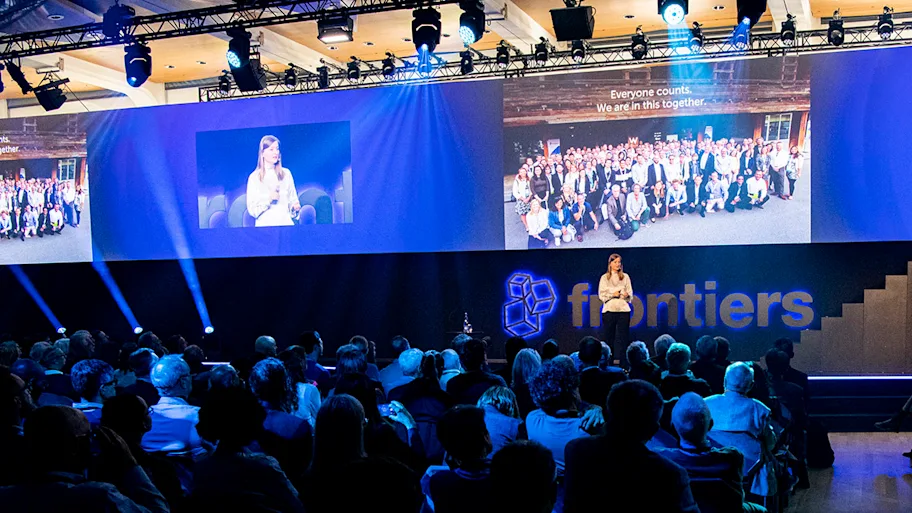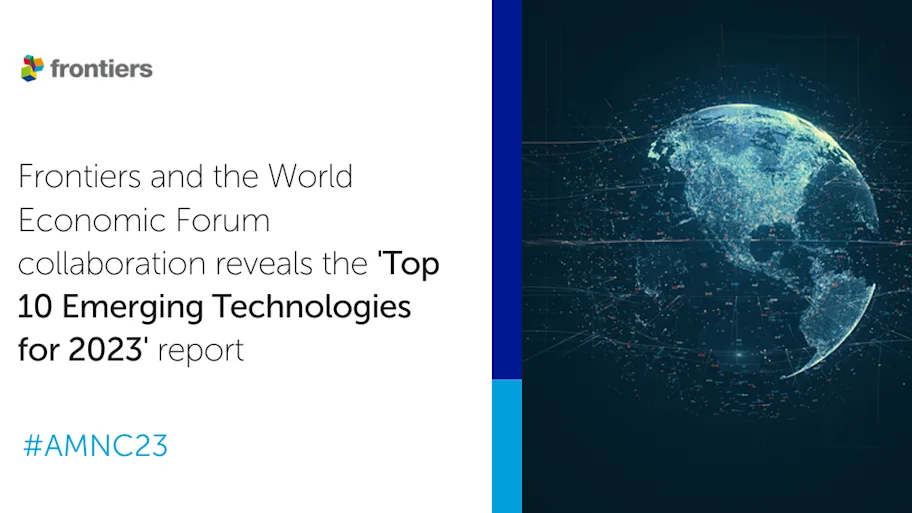
- Science news
- Frontiers news
- Looking back at the 2021 Frontiers Forum: A year of game-changing science
Looking back at the 2021 Frontiers Forum: A year of game-changing science
This year our Frontiers Forum opened its virtual doors in a series of webinars attended by over 21,000 of the world’s leading minds, to discuss and accelerate science-led solutions to the grand challenges of our time.

By bringing researchers, policymakers, innovators, and political leaders together around game-changing new developments, the Forum accelerates our Frontiers mission by sparking collaborations and actions to achieve healthy lives on a healthy planet.
This year’s webinar series was no exception. The speakers and panelists included two Nobel prize winners, four policy experts, and 11 professors from the world’s top institutions. All thought leaders in their fields, they outlined transformational approaches to stopping greenhouse gas emissions, revolutionizing our education system, and preserving biodiversity.
Several of the talks have already grown into open science collaborations that are framing new paradigms in high-priority areas of science.
Thank you to everyone who participated and for your overwhelmingly positive feedback. Keep an eye out for our 2022 line-up featuring further ground-breaking developments that will help all of us to live a healthy life on a healthy planet.
Catch up on (or re-watch!) these inspiring talks now.
2021 speakers
Jump to:
Al Gore | The case for climate optimism
Esther Duflo | Good economics for harder times
Harris Lewin | Genomics-led solutions for all life on Earth
Kongjian Yu | Healing the world’s cities
Axel Cleeremans | Solving consciousness
David Christian | Preparing our children as guardians of the planet

Former US Vice President and Nobel Laureate Al Gore outlined encouraging progress on the sustainability revolution – from market shifts towards clean energy, to new science-based emissions targets, to incredible advances in science and technology.
Panelists:
Kurt Vandenberghe, European Green Deal Advisor, European Commission
Joeri Rogelj, Director of Research Grantham Institute, Imperial College London
Naomi Oreskes, Professor of the History of Science, Harvard University.
Good economics for harder times

Nobel prize winner and best-selling author Prof Esther Duflo discussed her revolutionary, evidence-based approach to economics and the lessons it provides to challenges such as poverty alleviation, Covid-19, and climate change.
Panelists:
Asli Demirgüç-Kunt, Chief Economist Europe and Central Asia, World Bank
Oriana Bandiera, Professor of Economics, London School of Economics.
Genomics-led solutions for all life on Earth

Prof Harris Lewin showed how the moonshot Earth BioGenome Project he co-founded – which aims to sequence the genomes of 1.8 million species – will help efforts to slow extinction rates and mitigate climate change impacts, plus add billions to the bioeconomy.
Panelists:
Taukandjo Shikongo, Head of Access and Benefit-Sharing Unit, Convention on Biological Diversity
Catherine McCarthy, Compliance Manager - Nagoya Protocol & Access and Benefit Sharing, Wellcome Sanger Institute
Emmanouil Dermitzakis, Professor of Genetics, University of Geneva
Dennis Murray, Professor of Biology, Trent University, and Specialty Chief Editor, Frontiers in Ecology and Evolution.

Globally renowned ‘landscape architect’ Prof Kongjian Yu revealed how replacing concrete infrastructure with nature-based solutions is transforming city centers into beautiful spaces for people and biodiversity, while also cleansing water and better managing floods.
Panelists:
Ricardo Vives Guerra from the BiodiverCities project, an initiative of the World Economic Forum and the Government of Colombia
Clara Irazábal, Director and Professor of Urban Studies and Planning Program, University of Maryland
Sangwon Suh, Professor of Industrial Ecology Climate Change, Mitigation and Life Cycle Assessment, University of California, Santa Barbara, and Field Chief Editor, Frontiers in Sustainability.

Renowned consciousness researcher Prof Axel Cleeremans took us on a journey through the leading theories attempting to explain how we know who we are, and introduced a new ‘adversarial’ research approach that may finally solve this great mystery of our minds.
Panelists:
Liad Mudrik, Professor of Psychology, Tel Aviv University
Anil Seth, Professor of Cognitive and Computational Neuroscience, University of Sussex
Steve Fleming, Wellcome/Royal Society Sir Henry Dale Fellow, University College London.
Preparing our children as guardians of the planet

Prof David Christian argued for an education revolution through teaching Big History – a wide-angle approach to history covering 4.5 billion years and multiple disciplines that illuminates the complex connections between people and the Earth’s natural processes.
Panelists:
Mamokgethi Phakeng, Vice Chancellor, University of Cape Town
Archana Sharma, Principal Scientist, CERN, and Lead Advisor, Life Lab Foundation
Idan Segev, Professor of Neuroscience, Hebrew University of Jerusalem, and Field Chief Editor, Frontiers for Young Minds.






